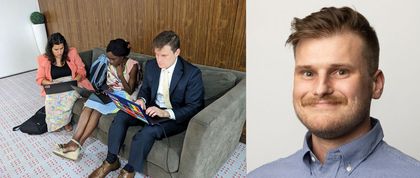From faculty research announcements to campus updates and global public health news, stay up-to-date on the latest from the School of Global Public Health.
News
Public Health Changemaker: Michael Bride, MPH '17 Connecting with Communities to Drive Change
January 29, 2026
While completing his MPH in Epidemiology Michael Bride, MPH '17 did community-based outreach, helping the West African community in New York City access services for the hepatitis B virus, which is en...
Continue
EP176 Tanzania Fieldwork: Climate Change and Systems Thinking with Bethel Abraham and Sona Fall
January 22, 2026
MPH students Bethel Abraham and Sona Fall share stories about their study abroad in Tanzania, which focused on low-cost strategies for waterborne diseases and waste management.
Continue
New Research: Ghost Gun Recoveries Associated with Suicide Rates in California
January 20, 2026
The rate of privately manufactured firearms, or “ghost guns,” recovered by law enforcement is associated with an increase in firearm suicide rates in California.
Continue
Lab Spotlight: HealthRight Last Mile Populations Lab
January 19, 2026
HealthRight interns are integral members of the team, supporting the development and implementation of programs, and advocating for the rights of marginalized communities.
Continue
New Research: Exclusive Breastfeeding May Protect Against Postpartum Depression
January 16, 2026
Mothers who exclusively breastfeed in the first months after giving birth are less likely to experience postpartum depression (PPD).
Continue
Sickle Cell Disease: 115 Years Later—A Path Forward for Equity and Innovation
January 8, 2026
Recapping the Sickle Cell Disease: 115 Years Later Symposium, a partnership between the ISEE Lab and the Institute for Excellence in Health Equity (IEHE).
Continue
Dr. Adolfo Cuevas Receives Early Career Impact Award
December 18, 2025
Dr. Adolfo Cuevas, associate professor of social and behavioral sciences, has been named a recipient of the Early Career Impact Award by the Federation of Associations in Behavioral & Brain Sciences.
Continue
Dr. Rumi Chunara Named Distinguished Member of Association for Computing Machinery
December 12, 2025
Dr. Rumi Chunara has been named a distinguished member of the Association for Computing Machinery (ACM).
Continue
Cool Course: Data, AI, and the People’s Health
December 8, 2025
Using real-world case studies and datasets, students in a new NYU School of Global Public Health class explore how algorithms are shaping our health.
Continue
Practice Spotlight: Umaima Abbasi
December 8, 2025
Hailing from Pakistan, Umaima enrolled in GPH after earning her bachelor's degree from the University of Michigan. Her interests center on vaccine-preventable diseases, with aspirations to design immu...
Continue
